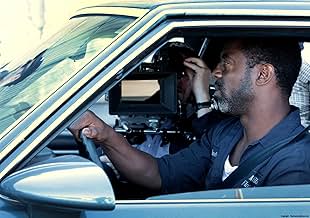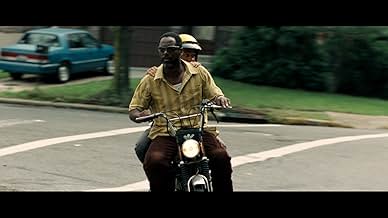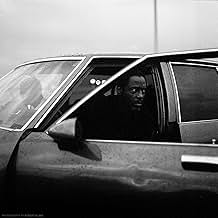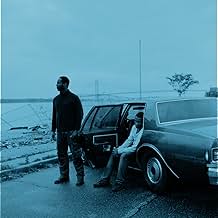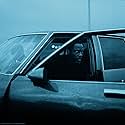AVALIAÇÃO DA IMDb
5,9/10
6,1 mil
SUA AVALIAÇÃO
Adicionar um enredo no seu idiomaAn abandoned boy is lured to America and drawn into the shadow of a dangerous father figure. Inspired by the real-life events that led to the 2002 Beltway sniper attacks.An abandoned boy is lured to America and drawn into the shadow of a dangerous father figure. Inspired by the real-life events that led to the 2002 Beltway sniper attacks.An abandoned boy is lured to America and drawn into the shadow of a dangerous father figure. Inspired by the real-life events that led to the 2002 Beltway sniper attacks.
- Direção
- Roteiristas
- Artistas
- Prêmios
- 2 vitórias e 14 indicações no total
Abner Expósito
- John's Little Boy
- (as Abner Exposito)
Raúl Aquino
- John's Bigger Boy
- (as Raul Aquino)
Nick Soviecke
- Recruit
- (as Nicholas Soviecke)
Avaliações em destaque
Arguably Isaiah Washington's best work. Thought provoking and on point. Everyone touched by violence should see this film to see how murderers are made. This film is not meant to be sympathetic to the killers but rather to start a dialog on how killers are made and what we can do to help people understand. It also highlights the issue of mental illness in our society and how we don't do enough, especially for our vets to address this problem. The director and cinematography should be applauded for this effort. Some of the best camera work I've seen in years coupled with an excellent script and vision by the director. For those who are looking for a sympathetic view for the victims, this is not that film. Yes, we should never forget the victims of these horrific crimes, but that's not what this film is about. It's about reaching those people who don't understand that sometimes killers are products of their circumstances and/or environment. A must see.
Those who demand easy answers in movies and clear cut motives from its characters will likely find Blue Caprice an unfulfilling and distant character study, one which centers on the Beltway Sniper attacks that left Washington paralyzed for three weeks in 2002. The brilliance of director Alexandre Moors feature debut, in addition to quietly powerful performances from its two main leads, is that it offers no definite answers as to why this massacre transpired. True to life, speculation as to motive ranges from plans to divert attention from the planned murder of one of the assailant's ex wife, revenge against the U.S. government, terrorist ties and general anarchy. Discovering what ultimately drives these monsters is unimportant in the context of this film, but rather it's the troubling and empty journey these men take down the path of evil that is so compelling.
Taking on the notorious gunmen John Allen Muhammad and Lee Boyd Malvo are Isaiah Washington and Tequan Richmond and both deliver nuanced and disturbing performances but with varying approaches. We witness a differing speed at which these two finally become the savages which made global headlines – these are individuals with which we both see deeply into but at the same time know nothing about. The way these actors and director are able to make enigmas out of its antagonists without resorting to painting them as faceless monsters is an extraordinary feat.
Channelling Idris Elba in the best ways, Washington does Oscar level work as a broken man whose anger and disillusionment manifests in the worst possible way. Between his work on Grey's Anatomy and supporting work in some higher profile fare, he has never really been given the chance to stretch his dramatic legs and he shows how capable he can be when given the spotlight. He plays off young Tequan Richmond with aplomb, with the promising North Carolina native truly coming into his character in the final act after long sequences of shyness and inwardly directed sadness. Among the most disquieting scenes comes when John teaches Lee how to drive, an act between father and son that is considered to be one of the most important bonding experiences of growing up. In knowing what is to come, it takes on a whole new (and ultimately very disturbing) meaning.
Aside from inherently being a taut and troubling scenario the way the tension and narrative drive is brought to the forefront is also noteworthy especially when the outcome is so widely known. When we first meet with Malvo (and to a lesser extent Muhammad) we see them as damaged but salvageable individuals – those given an unfair stab at life but who could display redemptive qualities if given the chance. As we see Malvo fall further and further under the manipulative spell of his surrogate father, and who in turn finds fuel in his adoptive son, it's hard to watch not simply because of their actions but where we know this is all headed. In wanting so much for these lost souls to find an honest meaning in life and see them both missing and avoiding them, the dread and tension ratchets up organically and with an impact you won't soon shake.
Moors also makes the sound decision never to distort or falsely heighten the actual acts of the shootings. Seeing a man in the throws of death in a pool of blood at the base of a gas pump is powerful enough without seeing these two perpetrate every single act. So to does the choice to not magnify the scope of the crimes with fictionalized getaways or close calls in their titular vehicle. The barrel of a gun sticking out of a trunk and an off screen shot does more than enough in the ugly world we're introduced to in Blue Caprice. There are certainly moments of graphic violence interspersed throughout but they're handled in a brief and ugly manner that serves to showcase the emptiness of it all.
Based on the subject matter and the recent horrific gun based acts that have rocked America as of late, Blue Caprice will no doubt bring up the hot button topic of gun control, with some likely looking at the film as a call for help and others as pro liberal pandering meant to take a past tragedy and use it as propaganda. In both instances they would be not only wrong but missing the point of this drama, or rather the pointlessness of these men's actions. Could this act have been avoided with tighter gun laws? Likely. But Blue Caprice has no such pretensions and simply paints a disturbing portrait of men on the edge of reality.
Both as a showcase for the skill of the filmmakers and actors and an examination of the flourishing emotional void this duo carries with them every day, Blue Caprice succeeds and does so in manner that will leave you exhausted and troubled. In having so much to hate on screen there is so much to love about this confident inaugural feature, one which worrisomely shows that the loss of one's humanity can begin with a single act.
Taking on the notorious gunmen John Allen Muhammad and Lee Boyd Malvo are Isaiah Washington and Tequan Richmond and both deliver nuanced and disturbing performances but with varying approaches. We witness a differing speed at which these two finally become the savages which made global headlines – these are individuals with which we both see deeply into but at the same time know nothing about. The way these actors and director are able to make enigmas out of its antagonists without resorting to painting them as faceless monsters is an extraordinary feat.
Channelling Idris Elba in the best ways, Washington does Oscar level work as a broken man whose anger and disillusionment manifests in the worst possible way. Between his work on Grey's Anatomy and supporting work in some higher profile fare, he has never really been given the chance to stretch his dramatic legs and he shows how capable he can be when given the spotlight. He plays off young Tequan Richmond with aplomb, with the promising North Carolina native truly coming into his character in the final act after long sequences of shyness and inwardly directed sadness. Among the most disquieting scenes comes when John teaches Lee how to drive, an act between father and son that is considered to be one of the most important bonding experiences of growing up. In knowing what is to come, it takes on a whole new (and ultimately very disturbing) meaning.
Aside from inherently being a taut and troubling scenario the way the tension and narrative drive is brought to the forefront is also noteworthy especially when the outcome is so widely known. When we first meet with Malvo (and to a lesser extent Muhammad) we see them as damaged but salvageable individuals – those given an unfair stab at life but who could display redemptive qualities if given the chance. As we see Malvo fall further and further under the manipulative spell of his surrogate father, and who in turn finds fuel in his adoptive son, it's hard to watch not simply because of their actions but where we know this is all headed. In wanting so much for these lost souls to find an honest meaning in life and see them both missing and avoiding them, the dread and tension ratchets up organically and with an impact you won't soon shake.
Moors also makes the sound decision never to distort or falsely heighten the actual acts of the shootings. Seeing a man in the throws of death in a pool of blood at the base of a gas pump is powerful enough without seeing these two perpetrate every single act. So to does the choice to not magnify the scope of the crimes with fictionalized getaways or close calls in their titular vehicle. The barrel of a gun sticking out of a trunk and an off screen shot does more than enough in the ugly world we're introduced to in Blue Caprice. There are certainly moments of graphic violence interspersed throughout but they're handled in a brief and ugly manner that serves to showcase the emptiness of it all.
Based on the subject matter and the recent horrific gun based acts that have rocked America as of late, Blue Caprice will no doubt bring up the hot button topic of gun control, with some likely looking at the film as a call for help and others as pro liberal pandering meant to take a past tragedy and use it as propaganda. In both instances they would be not only wrong but missing the point of this drama, or rather the pointlessness of these men's actions. Could this act have been avoided with tighter gun laws? Likely. But Blue Caprice has no such pretensions and simply paints a disturbing portrait of men on the edge of reality.
Both as a showcase for the skill of the filmmakers and actors and an examination of the flourishing emotional void this duo carries with them every day, Blue Caprice succeeds and does so in manner that will leave you exhausted and troubled. In having so much to hate on screen there is so much to love about this confident inaugural feature, one which worrisomely shows that the loss of one's humanity can begin with a single act.
This movie doesn't add anything, but it comes as a real bore! what they were thinking!, I have never thought much of Isaiah Washington as an actor, I could care less about his participation on every movie I have seen him before, and watching Tequan Richmond is like watching green paint dry, don't ask, but I think green paint is the most pathetic paint to watch while drying.
This movie is a really missed opportunity, the question is if the writer and producers Just said " Hey lets do an insipid, bland, characterless, and unmoving piece of nothing, "uninspired" on the beltway Sniper" the movie is not even all over the place, because has nothing to offer, it's a shameless situation that blue caprice get a 6.0 rating when "D.C. Sniper: 23 Days of Fear" is just 5.8
Yesterday, I re - watched Bus 174 (2002) (documentary) and then "Last Stop 174 (2008)", I mention this just in case Alexandre Moors, R.F.I. Porto and everyone involved with blue caprice wants to see how a real movie based in actual events is made!
This movie is a really missed opportunity, the question is if the writer and producers Just said " Hey lets do an insipid, bland, characterless, and unmoving piece of nothing, "uninspired" on the beltway Sniper" the movie is not even all over the place, because has nothing to offer, it's a shameless situation that blue caprice get a 6.0 rating when "D.C. Sniper: 23 Days of Fear" is just 5.8
Yesterday, I re - watched Bus 174 (2002) (documentary) and then "Last Stop 174 (2008)", I mention this just in case Alexandre Moors, R.F.I. Porto and everyone involved with blue caprice wants to see how a real movie based in actual events is made!
A well shot, moodily scored and impressively acted indie from last year, Blue Caprice is also a frustratingly cold film that in the end misses the mark in such a way that you just can't help but wish you were more affected by a story that is all different types of sad and horrific in equal measure.
Alexandre Moors film looks to delve into the events leading up to the tragic 2002 Beltway Sniper shootings around the USA that led to the deaths of 10 innocent civilians at the hands of John Muhammad and Lee Malvo. It must be noted that these events Moors displays in the film are largely dramatizations as facts concerning the two men remain sadly blurred. With the blurring of these facts and fictions the films growth as a narrative does suffer as what we are presented with is a strangely generic telling of a true story that is anything but. While moments in the film are at times extremely shocking and confronting they're merely short bursts of memorable material that quickly dissipates back to slow moving and uninvolving instances – these moments of quality are made increasingly more annoying due to the films many other affective sums not adding up to a satisfying whole.
Seasoned actor Isaiah Washington has rarely, if ever, been better than he is here in a role that must of required quite a lot of mental and emotional stress on his behalf. The character of John is a role that features much pent up rage and at times evil that Washington cleverly plays to and is backed up by a very assured performance from young actor Tequan Richmond as his surrogate son Lee. Lee is a boy whose lot in life has left him scarily low choices to make and Richmond does a fine job at displaying this sad boy and also excels at the moments where a boy becomes more than that and becomes a monster. Sarah Neufeld and Colin Stetson's affective score must also be commended here as a haunting accompanying piece to a growing terror.
A well-made movie yet undeniably cold and at times to distant for its own good Blue Caprice is an interesting look into an horrific situation that you get the feeling will one day be turned into a much bigger and affecting big screen treatment.
3 combat handbooks out of 5
Alexandre Moors film looks to delve into the events leading up to the tragic 2002 Beltway Sniper shootings around the USA that led to the deaths of 10 innocent civilians at the hands of John Muhammad and Lee Malvo. It must be noted that these events Moors displays in the film are largely dramatizations as facts concerning the two men remain sadly blurred. With the blurring of these facts and fictions the films growth as a narrative does suffer as what we are presented with is a strangely generic telling of a true story that is anything but. While moments in the film are at times extremely shocking and confronting they're merely short bursts of memorable material that quickly dissipates back to slow moving and uninvolving instances – these moments of quality are made increasingly more annoying due to the films many other affective sums not adding up to a satisfying whole.
Seasoned actor Isaiah Washington has rarely, if ever, been better than he is here in a role that must of required quite a lot of mental and emotional stress on his behalf. The character of John is a role that features much pent up rage and at times evil that Washington cleverly plays to and is backed up by a very assured performance from young actor Tequan Richmond as his surrogate son Lee. Lee is a boy whose lot in life has left him scarily low choices to make and Richmond does a fine job at displaying this sad boy and also excels at the moments where a boy becomes more than that and becomes a monster. Sarah Neufeld and Colin Stetson's affective score must also be commended here as a haunting accompanying piece to a growing terror.
A well-made movie yet undeniably cold and at times to distant for its own good Blue Caprice is an interesting look into an horrific situation that you get the feeling will one day be turned into a much bigger and affecting big screen treatment.
3 combat handbooks out of 5
In 2002, the Washington, DC area was rocked by a series of sniper shootings. Alexandre Moors examines the events leading up to the killings, focusing on the unorthodox relationship between John Allen Muhammad and teenager Lee Boyd Malvo in Blue Caprice, an unfortunately lifeless, plodding film that somehow manages to turn a riveting situation into a dull character study that fails even on that level.
Our story begins in the Caribbean, where John Allen Muhammad (Isaiah Washington) is vacationing with his three kids. Well, vacationing is a strong word, as apparently he's absconded with them from their mother, but more importantly this is where he runs into the young, lonely Lee Boyd Malvo (Tequan Richmond), who's just passing time after his mother's ditched him. Muhammad strikes up a paternal friendship with the boy and winds up bringing him to the United States, passing him off as his son.
The duo, now sans the children, wind up in Muhammad's old stomping grounds of Washington state, where they stay with John's old friend Ray (Tim Blake Nelson) and his wife Jamie (Joey Lauren Adams). While in Washington, Muhammad teaches his charge about life; specifically, how much it stinks and how killing a few people might be a good idea to square things with the world.
We follow Muhammad and Malvo essentially through the eyes of the boy. We learn he's a good shot with a handgun or a rifle (a natural, according to Ray, who knows nothing of Muhammad's plans). We see that Muhammad is the strong male influence on Malvo that the latter has probably never had. We learn that the kid, although quiet, has a cold, violent streak within him.
One reason the movie didn't work for me is that it seems to be perpetually building to some grand crescendo. Since this is based on a true story - with many facts accurate, according to my memory - the endgame is knowable. But for as much time is spent on the relationship between Malvo and Muhammad, it's a superficial treatment. What really makes either tick? We don't truly know. Even though Muhammad spouts off frequently about bringing down the system and how his ex-wife is evil, we don't really see how that resentment leaps into full-blown psychosis. In other words, what the heck really motivates him to kill innocent people? Moors doesn't even seem to speculate.
When all is said and done, we don't really know any more about the deadly duo than we do when we first encounter them in the film. There's hardly any character development, and that's true of the secondary characters as well. To use the old axiom, there's no there there. There's nothing. Even the moments that should have one jumping out of one's seat - such as when Malvo pulls the trigger - are telegraphed so obviously that they lose most of their emotional impact.
This movie may be better received outside of the DC area. Most of the audience at this screening were in the area during the shootings, and the sentiment seemed to be one of apathy, sort of the opposite of what a tragedy like this should evoke. People who were not directly affected by the shootings may be more amenable to the short shrift given to the story development and glacial pacing.
Our story begins in the Caribbean, where John Allen Muhammad (Isaiah Washington) is vacationing with his three kids. Well, vacationing is a strong word, as apparently he's absconded with them from their mother, but more importantly this is where he runs into the young, lonely Lee Boyd Malvo (Tequan Richmond), who's just passing time after his mother's ditched him. Muhammad strikes up a paternal friendship with the boy and winds up bringing him to the United States, passing him off as his son.
The duo, now sans the children, wind up in Muhammad's old stomping grounds of Washington state, where they stay with John's old friend Ray (Tim Blake Nelson) and his wife Jamie (Joey Lauren Adams). While in Washington, Muhammad teaches his charge about life; specifically, how much it stinks and how killing a few people might be a good idea to square things with the world.
We follow Muhammad and Malvo essentially through the eyes of the boy. We learn he's a good shot with a handgun or a rifle (a natural, according to Ray, who knows nothing of Muhammad's plans). We see that Muhammad is the strong male influence on Malvo that the latter has probably never had. We learn that the kid, although quiet, has a cold, violent streak within him.
One reason the movie didn't work for me is that it seems to be perpetually building to some grand crescendo. Since this is based on a true story - with many facts accurate, according to my memory - the endgame is knowable. But for as much time is spent on the relationship between Malvo and Muhammad, it's a superficial treatment. What really makes either tick? We don't truly know. Even though Muhammad spouts off frequently about bringing down the system and how his ex-wife is evil, we don't really see how that resentment leaps into full-blown psychosis. In other words, what the heck really motivates him to kill innocent people? Moors doesn't even seem to speculate.
When all is said and done, we don't really know any more about the deadly duo than we do when we first encounter them in the film. There's hardly any character development, and that's true of the secondary characters as well. To use the old axiom, there's no there there. There's nothing. Even the moments that should have one jumping out of one's seat - such as when Malvo pulls the trigger - are telegraphed so obviously that they lose most of their emotional impact.
This movie may be better received outside of the DC area. Most of the audience at this screening were in the area during the shootings, and the sentiment seemed to be one of apathy, sort of the opposite of what a tragedy like this should evoke. People who were not directly affected by the shootings may be more amenable to the short shrift given to the story development and glacial pacing.
Você sabia?
- CuriosidadesFirst theatrical film directed by Alexandre Moors.
- Erros de gravaçãoAs the blue Caprice is shown driving towards Washington DC, it has a different license plate number than it does during the rest of the film.
- Cenas durante ou pós-créditosIn the end roll on-screen credits, Ryan Maslyn is listed twice as Set Production Assistant.
- ConexõesFeatured in The 2014 Film Independent Spirit Awards (2014)
Principais escolhas
Faça login para avaliar e ver a lista de recomendações personalizadas
- How long is Blue Caprice?Fornecido pela Alexa
Detalhes
Bilheteria
- Faturamento bruto nos EUA e Canadá
- US$ 93.995
- Fim de semana de estreia nos EUA e Canadá
- US$ 13.400
- 15 de set. de 2013
- Faturamento bruto mundial
- US$ 93.995
- Tempo de duração1 hora 33 minutos
- Cor
- Proporção
- 2.35 : 1
Contribua para esta página
Sugerir uma alteração ou adicionar conteúdo ausente

Principal brecha
By what name was Chevrolet Azul (2013) officially released in India in English?
Responda

